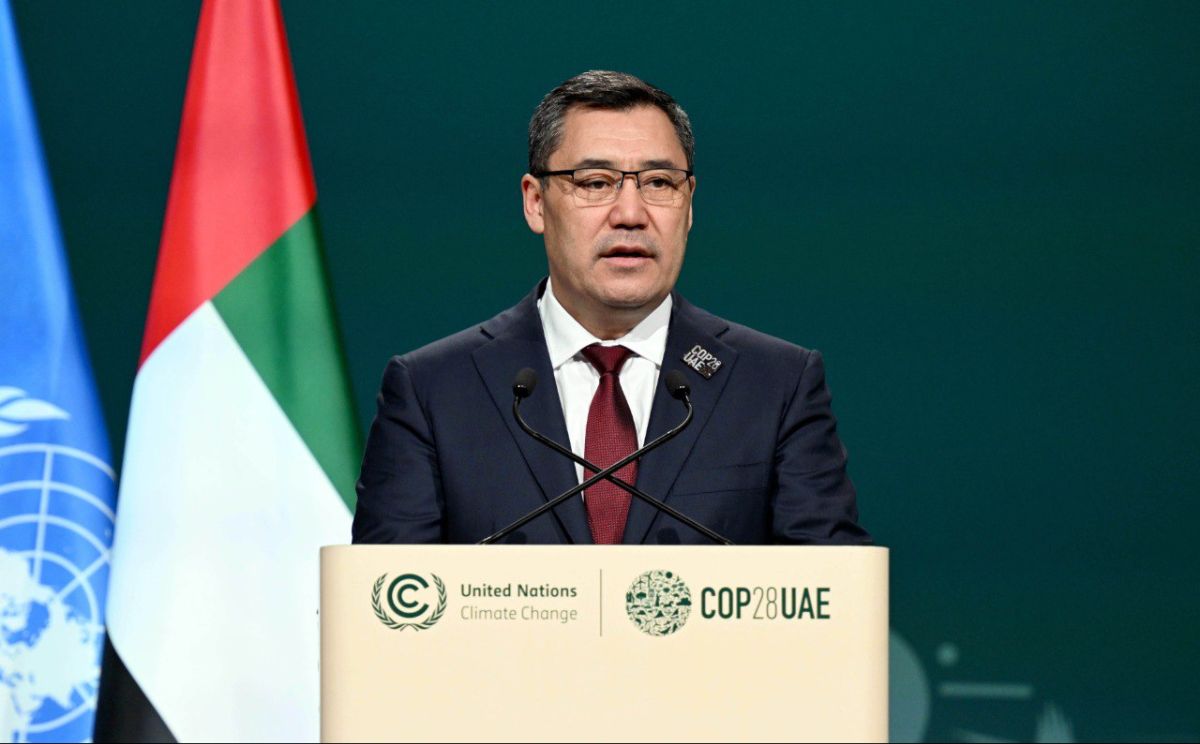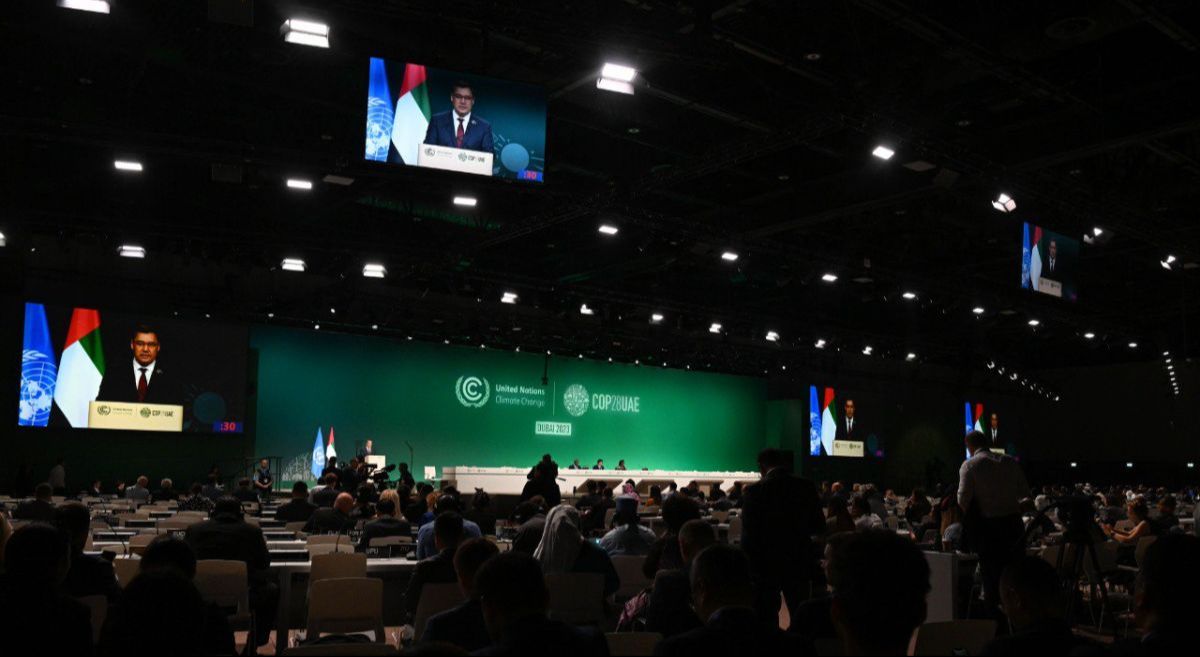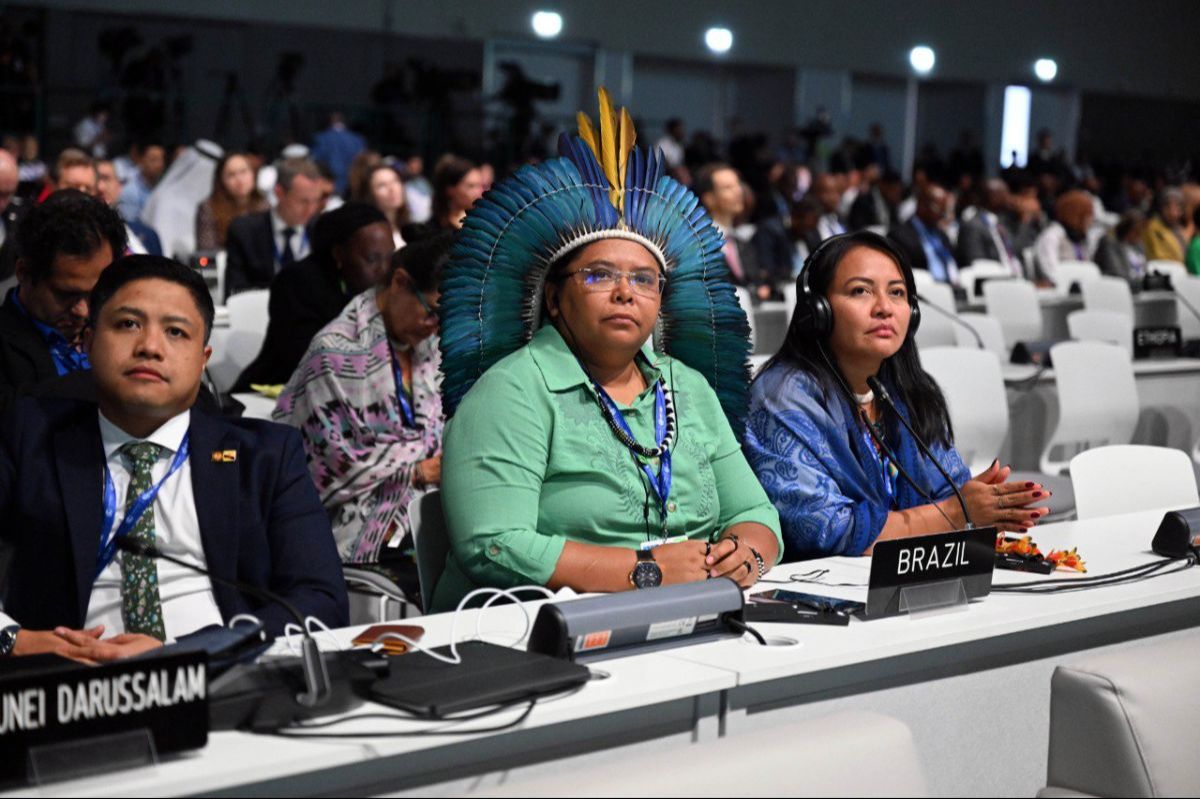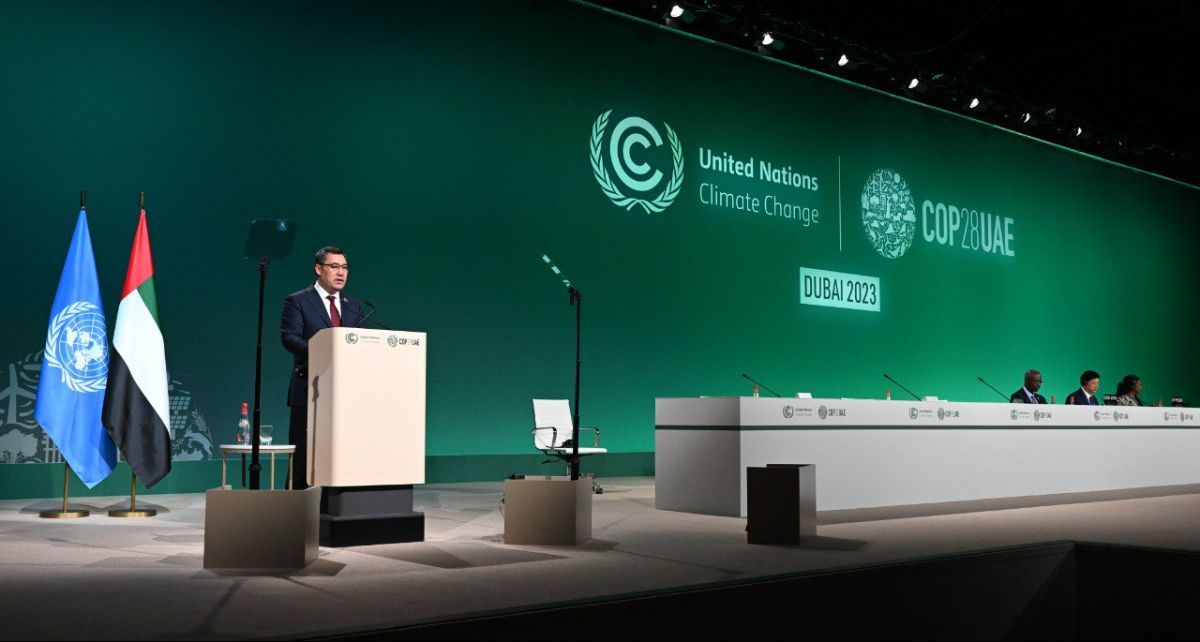President of Kyrgyzstan Sadyr Japarov delivered a speech at the 28th Conference of the Parties to the UN Framework Convention on Climate Change in Dubai, UAE

On 1 December, President of the Kyrgyz Republic Sadyr Zhaparov addressed the High-Level Segment of the 28th Conference of the Parties to the UN Framework Convention on Climate Change in Dubai (United Arab Emirates).
Here is the text of the speech of the Head of State:
"Dear Mr President,
Distinguished Heads of Delegations,
Ladies and gentlemen,
I express my gratitude to His Highness Sheikh Mohammed bin Zayed Al Nahyan, President of the United Arab Emirates, for organising the Climate Summit.
I hope that the Summit will not only identify the problems but also take decisions that must be implemented without delay.
We cannot allow our meetings to be followed by business as usual.
We must do everything in our power to ensure that this will have a favourable impact on the lives of our future generations.
According to experts, there is a sharp increase in temperature in Kyrgyzstan, as well as in Central Asia as a whole, compared to the global average.
Climate change has already led to intensive melting of glaciers and reduction of the area of glaciation, a sharp increase in periods of drought and low water, deterioration of human health, and an increasing number of natural disasters.
This has had and is having a very negative impact on key sectors of the economy, especially energy and agriculture.
The damage from direct and indirect losses is increasing every year.
Glaciers in the mountain ecosystems of Kyrgyzstan and Central Asia are of vital importance for water, energy and food security and environmental stability.
According to the latest World Meteorological Organisation report on water resources, the reduction of glaciation in the Tien Shan and Pamir mountains, which are part of the "Third Pole of the World", has had a negative impact on vital rivers in the region.
In this regard, our country has been a consistent driver of the agenda of integrating mountain issues into international negotiations at all levels for more than twenty years.
We are grateful to all partners for supporting the initiative of the Kyrgyz Republic to adopt a resolution on "Sustainable Mountain Development" at the 77th session of the UN General Assembly, within the framework of which 2023-2027 is declared the Five-Year Action Plan for the Development of Mountain Regions.
In implementing this initiative, we hope for the support not only of mountainous countries, but also of all other countries in implementing the adopted Global Plan of Action on this resolution of the UN General Assembly, since mountains are water towers that provide water to about 2 billion people.
Kyrgyzstan, realising the importance of collective action, unites countries in the Group of Friends of Mountain Countries, and has also joined the Group of Friends of the Cryosphere and the Forum of Countries Vulnerable to Climate Change, a platform that brings together the most vulnerable countries to climate change and those that produce the least amount of emissions.
We believe that, through such efforts, Kyrgyzstan is making its own contribution to the international community's common endeavours to combat climate change.
We call on the international community to support the efforts of mountain countries to address the climate and environmental problems of mountain ecosystems.
Dear Colleagues,
Kyrgyzstan, being a country with a low level of greenhouse gas emissions, remains committed to the goals of the Paris Agreement and plans to reduce emissions by 16% of the level of emissions under the "business as usual" scenario by 2030, and by 44% if there is international support.
By 2050, our country plans to achieve carbon neutrality on the platform of "green" development.
To realise these goals, Kyrgyzstan intends to implement renewable energy projects, including the construction of hydropower plants. We are currently using only 13 per cent of the total potential of 142.5 billion kilowatt-hours of electricity.
We are counting on funding from international development partners to realise our huge hydropower potential.
We believe that by launching RES projects we can achieve more efficient use and management of water resources in Kyrgyzstan and the region, taking into account the generation of environmentally friendly energy, which will contribute to strengthening energy, environmental and food security not only in our country, but also in other countries of the region.
We invite investors to invest in our "green" projects.
To attract investors, there is a constant process of improving the legislative framework aimed at improving the investment climate of the country, which provides favourable conditions for investors in the development of renewable energy sources.
A medium-term electricity tariff policy has been adopted, which makes it possible to increase the efficiency and investment attractiveness of power plant construction projects.
The Kyrgyz Republic has adopted a number of measures aimed at the development of RES and introduction of energy saving technologies.
RES subjects are provided with preferences, incentives and tax breaks. The tariff for them is 5 US cents without taxes.
A Green Energy Fund has been established, which has the right of perpetual use of lands suitable for RES utilisation.
In 2021, Kyrgyzstan was one of the first countries in Central Asia to submit an updated Nationally Determined Contribution to the Paris Agreement.
At present, we have developed an Implementation Plan for the NREAP and are finalising a long-term Concept for achieving carbon neutrality until 2050, as well as preparing a National Adaptation Plan.
We are developing the programme "Establishment of a National Enhanced Transparency Framework under the Paris Agreement", aimed at increasing the transparency of climate measures in accordance with internationally recognised standards.
The Kyrgyz Republic is also actively engaged in implementing the national programme "Jashyl Muras" to increase forest areas, and in 2022 alone we planted more than 8 million plantations.
Dear participants,
Climate change, which is obvious to everyone, shows that humanity is moving towards self-destruction, emissions are breaking records, and the financial commitments of industrialised countries remain unfulfilled.
At the same time, the goal of accumulating $100 billion in funding annually has not yet been met. The goal of accumulating $100 billion annually has not yet been met.
In accordance with the spirit of the Paris Agreement, I call on the global community, primarily developed countries, to more actively support developing vulnerable mountain countries, including through the early launch of the Loss and Damage Fund, the provision of direct financial support and the latest technologies on non-repayable terms, as well as the creation of mechanisms for the exchange of foreign debt for climate projects.
Moreover, I would like to draw the attention of donor countries to the fact that the process and mechanism for obtaining available climate finance is complicated, financial resources are not concentrated and are distributed through a large number of different funds, agencies and institutions.
This, in my opinion, does not contribute to the efficient and equitable distribution of available financial resources.
I call on the international community, first and foremost developed donor countries, to work more purposefully to accumulate climate finance, simplify the mechanisms for receiving it and create new mechanisms to support developing countries.
I am convinced that the creation of innovative mechanisms and investment instruments will help to attract financial resources to support sustainable adaptation and mitigation projects.
It is necessary to involve the private sector in the accumulation of climate finance.
It is important to strengthen partnerships between Governments, the private sector and international financial institutions.
I trust that the issue of mountain ecosystems will be included as a priority issue on the agenda of COP-28, similar to that of small island developing States, and we will work actively at subsequent Conferences of the Parties.
In conclusion, I would like to call for action now for the sake of future generations.
I am convinced that only together can we change course and lay the foundation for a secure and sustainable future for our planet.
Thank you for your attention.











